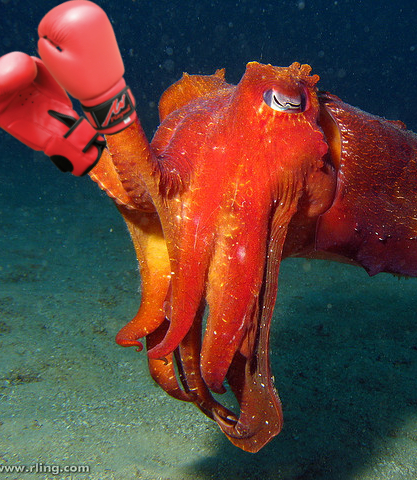Study shows cuttlefish plan scuffles
 Research has revealed an intriguing behaviour displayed by the cuttlefish – it sizes up a counterpart and adjusts its fighting style before battle.
Research has revealed an intriguing behaviour displayed by the cuttlefish – it sizes up a counterpart and adjusts its fighting style before battle.
The study demonstrates that male cuttlefish modify their behaviour by assessing the fighting ability of their opponent relative to their own. The work also provides one of the few definitive examples of mutual assessment in the animal kingdom.
“Animal contests in many species had previously been reported to be resolved through the process of mutual assessment, for example, when competitors use information about their opponent to decide whether to fight or surrender. But recently, several research papers called the validity of such claims into question,” said Macquarie University researcher Dr Alex Schnell.
“By using an integrative research approach in the lab, this study was able to address these concerns and clearly demonstrate that male cuttlefish can assess and then modify their behaviour according to the attributes of their opponent.”
The study involved experiments on giant Australian cuttlefish, Sepia apama, which are renowned for large mating aggregations where males compete fiercely for females using spectacular colourful displays.
“If a male cuttlefish was challenged by a relatively smaller competitor, he would exhibit a range of aggressive behaviours and fighting displays. Intriguingly, if the same male cuttlefish was challenged by a relatively larger competitor, he would exhibit submissive behaviours, such as fleeing, inking or camouflage patterns,” said Dr Schnell.
“This remarkable ability to recognise size differences and then shift from aggressive to submissive behaviours provides compelling evidence for a mutual assessment fighting strategy in these large-brained invertebrates.”
The Macquarie team set up a series of fights between cuttlefish in the lab. They were conducted to test game theory models, which provide a framework for investigating conflict resolution in animals. The research also investigated the cuttlefishes’ motivation to fight and their decision-making abilities during aggressive interactions.
Macquarie University co-author, Professor Rob Harcourt, said: “This is a very exciting result, as cephalopods are separated by millions of years of evolution from the more familiar mammals and birds. To see that giant cuttlefish are capable of such complex assessments indicates selection pressures may act in parallel across the biological realms.”
The findings could become important foundations for investigating more intricate details of cephalopod fighting behaviour and competition. The team says it integrative approach may also be used to test for mutual assessment in a wide range of visually-oriented animals.








 Print
Print